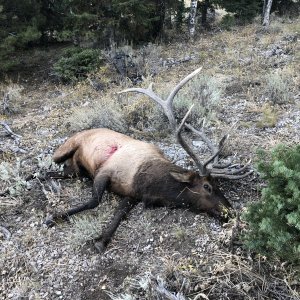J
juliusvatalaro
Guest
Montana/Molloy wolf settlement announcement. What does it mean?
Important Big Game Forever updates from last week!
Policy vs. Politics: Getting Past the Rhetoric and False Promises of Wolf Delisting
As many of you are already aware, there were some major developments on the wolf delisting front last week. The government dropped it's appeal of Judge Johnson?s ruling in favor of Wyoming?s wolf plan. 9 of 13 environmental plaintiff?s settled out of the Molloy decision which could mean a wolf hunt for Idaho and Montana next season (if accepted by the Judge).
What does it all mean? Are we on the right track?
What this all shows is that the effort of Big Game Forever, sportsmen from across the country, and other partner organizations is making a huge difference. Leaders in Congress have wolf delisting high on their priority lists. Press releases directed to settlement proposals announced last week all included references to increasing pressure in Congress. Your efforts are making the key difference.
This article spells out why some proposed wolf-delisting bills are very good and some are very bad. There are efforts to use our urgency to get wolves delisted to pass some bills that will be bad for the future of hunting. We explain simple tests to understand the difference between a short-term promise and a long-term solution. We also explain how business as usual will not fix the wolf problem. Finally, the article talks about the type of effort required to overcome years of ambivalence about the future of wolves and wildlife in America.
Why did we go to Congress?
I believe all sportsmen support the notion of having a wolf hunt to potentially allow for recovery of some elk, moose and deer herds. However, a wolf hunt isn't enough to provide meaningful recovery of wildlife herds. Nor can the root failures of the wolf experiment be fixed simply by a wolf hunt. To begin restoring balance of wildlife populations in the West and Upper Midwest, state wildlife managers need to be able to do their job. How does that happen?
Short Term Promises vs. Long Term Solutions
Over the last several months, we have seen multiple bills, settlement proposals etc. that have been heralded as ?wolf-delisting.? If you see a promise of wolf delisting, be warned. A lot of these promises are what Representative Cynthia Lummis (R), Wyoming has described as a ?wolf in sheep?s clothing.? Some, if not most of these bills, fall short of providing the long-term solutions needed to fix this mess.
Here is a test to determine whether the proposed ?wolf delisting? is a short-term promise or a long term solution: Does the provision (a) return primacy of state wildlife decision making authority; or does it (b) leave wolf management subject to federal statute and ongoing federal oversight? If wolves remain subject to federal statute, all of the same structural flaws that have led to years of frustration and delays remain firmly in place. This means the government is saying once again, to rely on trust instead of legal protections for the future of proper wolf management. This model has not worked for 20 years. It will not work now.
Here is why State Management vs Federal Control is so Important
State Wildlife Management
States are the only political unit with full jurisdiction to manage ALL wildlife. This applies to game as well as hundreds, and perhaps thousands, of non-game species. The Federal Government doesn't really manage wildlife on its own, but is rather is given limited authority over distinct wildlife issues such as endangered species and migratory waterfowl. State wildlife management provides protection for wildlife while also providing important management flexibility. This flexibility allows states to adjust appropriately to changing circumstances to ensure the health of big game and non-game species.
Federal Control
Federal wildlife statutes by contrast are directed to a limited range of wildlife issues. Most ?federal management activities? are typically fulfilled by state wildlife managers as the ?designated agent.? In most circumstances, when wildlife issues are under federal protections such as the Endangered Species Act, needed flexibility is replaced with restrictions. More importantly, federal statutes provide a powerful tool chest of one-sided litigation provisions for private plaintiffs. Most of these provisions remove flexibility in management decisions by states or the federal government. These restriction and litigation provisions were originally developed for unsuccessful species that do not compete well in their natural environment and tend to have little direct impact on other wildlife populations. More importantly, it was assumed that such provisions would be utilized by private plaintiffs with common sense. This clearly has not been the case with wolves and wolf litigation.
Wolf Hunt vs Restoring Balance
For months we have been talking about Congressional action to ?delist wolves from the Endangered Species act.? What we are really talking about is returning flexibility in management decisions to state wildlife managers. Many feel a federally supervised wolf hunt is a step in the right direction. But much more important than just a wolf hunt is the importance of removing wolves from the difficult and one-sided litigation provisions of federal statute that have led to an endless cycle of litigation. This litigation will continue to prevent state wildlife managers from doing their job. In other words, if we hope to restore balance to game herds, primacy of state wildlife decision-making must also be restored when it comes to wolves. From a practical standpoint, this will not happen as long as: (a) the federal government remains in an oversight role; and (b) the one-sided litigation provisions can be abused by environmental and animal rights litigants. Removing these litigation provisions is a simple as removing wolves from the federal statutes. All state wildlife protections will remain in place for wolves under this scenario.
Understanding the Tester/Baucus/Simpson Bills and Molloy Settlement
Here is a quick application of the litmus test to the ?other? bills. There are three other ?bills? which are often discussed: (1) the Tester/Baucus bill; (2) the Simpson language in the Continuing Resolution (much the same as the Tester/Baucus bill); (3) the Molloy settlement provisions. These bills and almost every other wolf bill we have seen fail to pass the test. In other words, under all of these provisions, wolves remain subject to federal oversight; federal statutes and related litigation provisions. As a result, these bills fail to remove the litany of impediments which have: (1) prevented effective wolf management; and (2) prevented recovery of elk, moose and deer herds. It is important that we do not fall for these promises as ?wolf delisting.? Most of these bills simply mean the state will be managing according to federal approved guidelines. Once again, this does not provide the flexibility state?s need to do their job.
Well intentioned or not, we are once again being asked to ignore the failures of federal statutes. We know federal statutes do not work when it comes to dealing with a capable, resilient and often destructive predator like the wolf. More significantly, many of these bills have underlying ?poison pill? provisions that really are the equivalent of a ?wolf in sheep?s clothing.? For example, the Tester/Baucus/Simpson provisions create the potential for an indefinite wolf listing and remove key safeguards that allow states to challenge such provisions. Additionally, the provision would have the effect of reversing Judge Johnson?s ruling in favor of: (a) state wildlife management supremacy over federal micromanagement; and (b) Wyoming?s wolf management plan. As another example, the Molloy settlement would allow the federal government to undo longstanding agreements related to wolf minimum numbers and also includes other ?poison pills.? All of these provisions ignore the need for Midwestern delisting and protecting other states from a future of wolf problems.
Hatch/Rehberg Bills S. 249 and H.R. 509
The American Big Game and Livestock Protection Act is the only bill, settlement, or compromise that actually passes the test. Under its provisions wolf populations are removed from federal statutes and returned to state wildlife protections. H.R. 509 and S. 249 will allow states to manage wolf populations along with other wildlife in balance and with much needed flexibility. Wolf populations are highly resilient and will do fine under state wildlife management. If numbers fall too low, Congress can once again relist the species. States and Sportsmen will not let that happen. No one wants to go through this mess again.
Allowing Congress to implement a one-time emergency provision for wolves is good public policy. Most experts agree that the wolf is one ?endangered species? that does not fit the policy rationales underlying the Endangered Species Act. Some in Congress are using the rhetoric that ?we are trying to gut the ESA.? The purpose of the ESA is to recover endangered species. While wolves have never been globally endangered, even local recovery goals were accomplished years and years ago.
Congressional wolf delisting in fact protects the ESA. First, it protects the ESA by fulfilling the promises that delisting will follow recovery. Second, congressional delisting protects the ESA from abuses of the environmental groups. These groups are now using the ESA for personal gain rather than for its intended purposes. The resultant delays in delisting are actually harming wildlife. Talk about turning things upside down. These abuses are the real challenge to credibility of the Endangered Species Act in the eyes of the public and elected officials.
Business as usual
The leaders of Big Game Forever have been through many political battles that others have said could not be won. We know that business as usual will not work when it comes to wolves. The anti-hunting groups and some key officials in the Obama administration do not want decision making and flexibility over wolf management returned to the states. They do not want us to work together. They know that if we do work together we are difficult, if not impossible, to beat. Business as usual is how we have gotten into the mess in the first place. We cannot and we do not intend to win this important political battle on our own. Nor can we afford divisiveness or poor legislative strategy by groups within our own industry. Working together as a nation of United Sportsmen we can provide the necessary support in Congress to get this done. Sportsmen, conservation groups and shooting non-profit organizations raise tens of millions of dollars annually to protect the future of shooting and hunting in this country. It is time for the leaders in wildlife to ?put their money where their mouth is.? There are also tens of millions of dedicated sportsmen in America. If we work together, we have the resources to get wolf delisting done right.
This is a fight for fundamental freedoms. We call on all shooting, livestock and hunting non-profit organizations to stick together and finish the job we started. United we stand. Divided we fall. We call on every sportsmen and every American to get in the fight to protect our hunting heritage and America?s Wildlife. We are much more powerful that many recognize. It is time to flex our collective muscles to protect America?s Big Game and Wildlife Resources.
Now is a great time to send another message to your elected officials. Use our automated system at http://biggameforever.org/takeaction to send a message to your elected officials in support of H.R. 509 and S. 249 to return flexibility and state management authority over America?s wolf populations. Or simply join the effort by signing the petition at http://biggameforever.org/ in support of wolf delisting.
Ryan Benson
http://biggameforever.org/
[email protected]
Important Big Game Forever updates from last week!
Policy vs. Politics: Getting Past the Rhetoric and False Promises of Wolf Delisting
As many of you are already aware, there were some major developments on the wolf delisting front last week. The government dropped it's appeal of Judge Johnson?s ruling in favor of Wyoming?s wolf plan. 9 of 13 environmental plaintiff?s settled out of the Molloy decision which could mean a wolf hunt for Idaho and Montana next season (if accepted by the Judge).
What does it all mean? Are we on the right track?
What this all shows is that the effort of Big Game Forever, sportsmen from across the country, and other partner organizations is making a huge difference. Leaders in Congress have wolf delisting high on their priority lists. Press releases directed to settlement proposals announced last week all included references to increasing pressure in Congress. Your efforts are making the key difference.
This article spells out why some proposed wolf-delisting bills are very good and some are very bad. There are efforts to use our urgency to get wolves delisted to pass some bills that will be bad for the future of hunting. We explain simple tests to understand the difference between a short-term promise and a long-term solution. We also explain how business as usual will not fix the wolf problem. Finally, the article talks about the type of effort required to overcome years of ambivalence about the future of wolves and wildlife in America.
Why did we go to Congress?
I believe all sportsmen support the notion of having a wolf hunt to potentially allow for recovery of some elk, moose and deer herds. However, a wolf hunt isn't enough to provide meaningful recovery of wildlife herds. Nor can the root failures of the wolf experiment be fixed simply by a wolf hunt. To begin restoring balance of wildlife populations in the West and Upper Midwest, state wildlife managers need to be able to do their job. How does that happen?
Short Term Promises vs. Long Term Solutions
Over the last several months, we have seen multiple bills, settlement proposals etc. that have been heralded as ?wolf-delisting.? If you see a promise of wolf delisting, be warned. A lot of these promises are what Representative Cynthia Lummis (R), Wyoming has described as a ?wolf in sheep?s clothing.? Some, if not most of these bills, fall short of providing the long-term solutions needed to fix this mess.
Here is a test to determine whether the proposed ?wolf delisting? is a short-term promise or a long term solution: Does the provision (a) return primacy of state wildlife decision making authority; or does it (b) leave wolf management subject to federal statute and ongoing federal oversight? If wolves remain subject to federal statute, all of the same structural flaws that have led to years of frustration and delays remain firmly in place. This means the government is saying once again, to rely on trust instead of legal protections for the future of proper wolf management. This model has not worked for 20 years. It will not work now.
Here is why State Management vs Federal Control is so Important
State Wildlife Management
States are the only political unit with full jurisdiction to manage ALL wildlife. This applies to game as well as hundreds, and perhaps thousands, of non-game species. The Federal Government doesn't really manage wildlife on its own, but is rather is given limited authority over distinct wildlife issues such as endangered species and migratory waterfowl. State wildlife management provides protection for wildlife while also providing important management flexibility. This flexibility allows states to adjust appropriately to changing circumstances to ensure the health of big game and non-game species.
Federal Control
Federal wildlife statutes by contrast are directed to a limited range of wildlife issues. Most ?federal management activities? are typically fulfilled by state wildlife managers as the ?designated agent.? In most circumstances, when wildlife issues are under federal protections such as the Endangered Species Act, needed flexibility is replaced with restrictions. More importantly, federal statutes provide a powerful tool chest of one-sided litigation provisions for private plaintiffs. Most of these provisions remove flexibility in management decisions by states or the federal government. These restriction and litigation provisions were originally developed for unsuccessful species that do not compete well in their natural environment and tend to have little direct impact on other wildlife populations. More importantly, it was assumed that such provisions would be utilized by private plaintiffs with common sense. This clearly has not been the case with wolves and wolf litigation.
Wolf Hunt vs Restoring Balance
For months we have been talking about Congressional action to ?delist wolves from the Endangered Species act.? What we are really talking about is returning flexibility in management decisions to state wildlife managers. Many feel a federally supervised wolf hunt is a step in the right direction. But much more important than just a wolf hunt is the importance of removing wolves from the difficult and one-sided litigation provisions of federal statute that have led to an endless cycle of litigation. This litigation will continue to prevent state wildlife managers from doing their job. In other words, if we hope to restore balance to game herds, primacy of state wildlife decision-making must also be restored when it comes to wolves. From a practical standpoint, this will not happen as long as: (a) the federal government remains in an oversight role; and (b) the one-sided litigation provisions can be abused by environmental and animal rights litigants. Removing these litigation provisions is a simple as removing wolves from the federal statutes. All state wildlife protections will remain in place for wolves under this scenario.
Understanding the Tester/Baucus/Simpson Bills and Molloy Settlement
Here is a quick application of the litmus test to the ?other? bills. There are three other ?bills? which are often discussed: (1) the Tester/Baucus bill; (2) the Simpson language in the Continuing Resolution (much the same as the Tester/Baucus bill); (3) the Molloy settlement provisions. These bills and almost every other wolf bill we have seen fail to pass the test. In other words, under all of these provisions, wolves remain subject to federal oversight; federal statutes and related litigation provisions. As a result, these bills fail to remove the litany of impediments which have: (1) prevented effective wolf management; and (2) prevented recovery of elk, moose and deer herds. It is important that we do not fall for these promises as ?wolf delisting.? Most of these bills simply mean the state will be managing according to federal approved guidelines. Once again, this does not provide the flexibility state?s need to do their job.
Well intentioned or not, we are once again being asked to ignore the failures of federal statutes. We know federal statutes do not work when it comes to dealing with a capable, resilient and often destructive predator like the wolf. More significantly, many of these bills have underlying ?poison pill? provisions that really are the equivalent of a ?wolf in sheep?s clothing.? For example, the Tester/Baucus/Simpson provisions create the potential for an indefinite wolf listing and remove key safeguards that allow states to challenge such provisions. Additionally, the provision would have the effect of reversing Judge Johnson?s ruling in favor of: (a) state wildlife management supremacy over federal micromanagement; and (b) Wyoming?s wolf management plan. As another example, the Molloy settlement would allow the federal government to undo longstanding agreements related to wolf minimum numbers and also includes other ?poison pills.? All of these provisions ignore the need for Midwestern delisting and protecting other states from a future of wolf problems.
Hatch/Rehberg Bills S. 249 and H.R. 509
The American Big Game and Livestock Protection Act is the only bill, settlement, or compromise that actually passes the test. Under its provisions wolf populations are removed from federal statutes and returned to state wildlife protections. H.R. 509 and S. 249 will allow states to manage wolf populations along with other wildlife in balance and with much needed flexibility. Wolf populations are highly resilient and will do fine under state wildlife management. If numbers fall too low, Congress can once again relist the species. States and Sportsmen will not let that happen. No one wants to go through this mess again.
Allowing Congress to implement a one-time emergency provision for wolves is good public policy. Most experts agree that the wolf is one ?endangered species? that does not fit the policy rationales underlying the Endangered Species Act. Some in Congress are using the rhetoric that ?we are trying to gut the ESA.? The purpose of the ESA is to recover endangered species. While wolves have never been globally endangered, even local recovery goals were accomplished years and years ago.
Congressional wolf delisting in fact protects the ESA. First, it protects the ESA by fulfilling the promises that delisting will follow recovery. Second, congressional delisting protects the ESA from abuses of the environmental groups. These groups are now using the ESA for personal gain rather than for its intended purposes. The resultant delays in delisting are actually harming wildlife. Talk about turning things upside down. These abuses are the real challenge to credibility of the Endangered Species Act in the eyes of the public and elected officials.
Business as usual
The leaders of Big Game Forever have been through many political battles that others have said could not be won. We know that business as usual will not work when it comes to wolves. The anti-hunting groups and some key officials in the Obama administration do not want decision making and flexibility over wolf management returned to the states. They do not want us to work together. They know that if we do work together we are difficult, if not impossible, to beat. Business as usual is how we have gotten into the mess in the first place. We cannot and we do not intend to win this important political battle on our own. Nor can we afford divisiveness or poor legislative strategy by groups within our own industry. Working together as a nation of United Sportsmen we can provide the necessary support in Congress to get this done. Sportsmen, conservation groups and shooting non-profit organizations raise tens of millions of dollars annually to protect the future of shooting and hunting in this country. It is time for the leaders in wildlife to ?put their money where their mouth is.? There are also tens of millions of dedicated sportsmen in America. If we work together, we have the resources to get wolf delisting done right.
This is a fight for fundamental freedoms. We call on all shooting, livestock and hunting non-profit organizations to stick together and finish the job we started. United we stand. Divided we fall. We call on every sportsmen and every American to get in the fight to protect our hunting heritage and America?s Wildlife. We are much more powerful that many recognize. It is time to flex our collective muscles to protect America?s Big Game and Wildlife Resources.
Now is a great time to send another message to your elected officials. Use our automated system at http://biggameforever.org/takeaction to send a message to your elected officials in support of H.R. 509 and S. 249 to return flexibility and state management authority over America?s wolf populations. Or simply join the effort by signing the petition at http://biggameforever.org/ in support of wolf delisting.
Ryan Benson
http://biggameforever.org/
[email protected]





![IMG_1521[1].JPG](/xf/data/xfmg/thumbnail/13/13402-f48f46a5626a1c26736b27a399d54ddb.jpg?1621435739)






